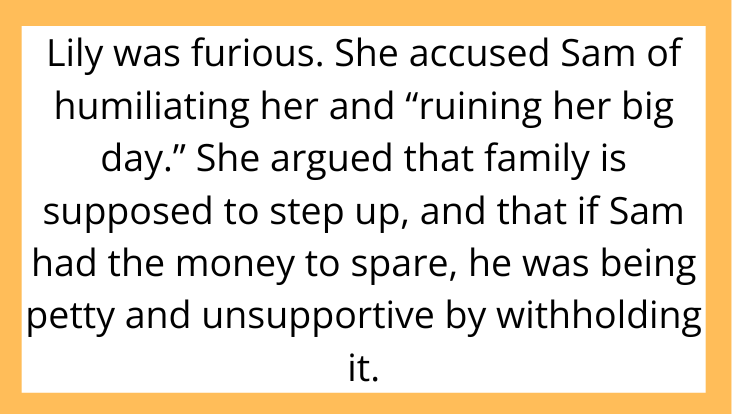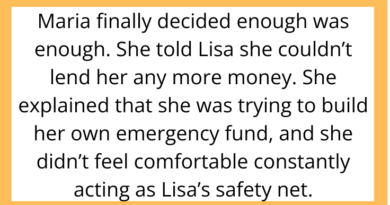AITAH for Refusing to Pay for My Sister’s Wedding After She Blew Her Budget?
When it comes to family, money can complicate even the closest relationships. Today’s AITAH scenario dives into a sibling conflict that has sparked thousands of heated opinions online: Are you the villain for saying “no” when a loved one mismanages their finances?
Let’s unpack this dilemma in detail.
The Story: A Generous Offer Gone Wrong

A 33-year-old man—let’s call him Sam—posted on r/AITAH about a situation that turned a family celebration into a bitter argument. Sam’s younger sister, Lily, recently got engaged. Knowing that Lily and her fiancé were on a tight budget, Sam offered to contribute $5,000 toward her wedding as a gift.
Lily was thrilled. She thanked Sam profusely and assured him that this generous contribution would cover nearly half of her planned expenses.
But over the following months, Lily’s plans kept growing. Instead of the intimate ceremony she originally described, she booked a luxury venue, hired an expensive photographer, and selected designer dresses for her bridal party. Before long, her budget had tripled.
The Confrontation: When Enough Is Enough

Two weeks before the wedding, Lily called Sam in tears. She’d run out of money—again. She needed an additional $10,000 to pay her vendors or risk canceling the event altogether.
Sam was stunned. He explained that while he was happy to give the original $5,000, he never agreed to fund a lavish wedding. He politely declined to contribute any more.
Lily was furious. She accused Sam of humiliating her and “ruining her big day.” She argued that family is supposed to step up, and that if Sam had the money to spare, he was being petty and unsupportive by withholding it.
Sam turned to Reddit for perspective: AITAH for refusing to bail my sister out after she blew her wedding budget?
The Arguments: Sibling Duty vs. Financial Boundaries

In Sam’s Corner: Reasonable Limits
Sam’s stance resonated with many. He had already made a generous offer. It wasn’t his responsibility to fund the entire event just because his sister overcommitted.
One Reddit user summed it up perfectly:
“A gift isn’t a blank check. You gave her $5,000—plenty of people get married on far less.”
Financial boundaries are vital, especially within families where expectations can spiral. If Sam caved, Lily might expect him to rescue her from future financial mistakes.
In Lily’s Corner: The Emotional Appeal
Others empathized with Lily’s disappointment. Weddings carry enormous pressure to meet social expectations, and many couples feel overwhelmed trying to “do it right.” From Lily’s perspective, Sam’s refusal felt like a betrayal during what should have been the happiest time of her life.
Still, even these commenters conceded that planning responsibly—and honoring the limits of a gift—was ultimately Lily’s responsibility.
The Bigger Issue: Entitlement vs. Generosity

This situation highlights a deeper tension many families face: When does generosity cross into enabling? And when does a loved one’s entitlement become the real problem?
Sam’s decision wasn’t just about money—it was about principle. If he had stepped in with another $10,000, it likely would have sent a message: It’s okay to spend recklessly because someone will always save you.
What Reddit Decided

The top comments were unanimous: Sam was not the villain.
“You already gave her a massive gift,” one person wrote. “She needs to learn to budget, not rely on you as a backup plan.”
Others urged Sam to stand firm and suggested he send a card wishing Lily well but not to engage further in the drama.
A few commenters advised a more diplomatic approach, such as offering to pay a smaller amount—perhaps $1,000—to help with last-minute expenses. But almost everyone agreed that Sam was within his rights to say no.
Lessons Learned: The Power of Boundaries

Money and Family Don’t Mix—Without Clear Agreements
When giving money to relatives, clarity matters. Sam could have saved stress by spelling out upfront:
“I’m giving you $5,000—please don’t plan beyond your means expecting more.”
Setting expectations early helps prevent resentment later.
It’s Okay to Say No
This scenario also underscores an uncomfortable truth: Sometimes, being the “bad guy” in the moment is better than becoming an endless source of rescue.
Lily’s reaction was emotional, but that doesn’t make Sam responsible for her choices. Saying no can feel harsh, but it’s often the healthiest option for everyone involved.



